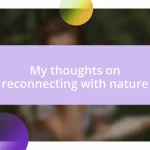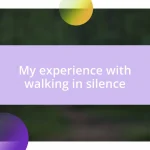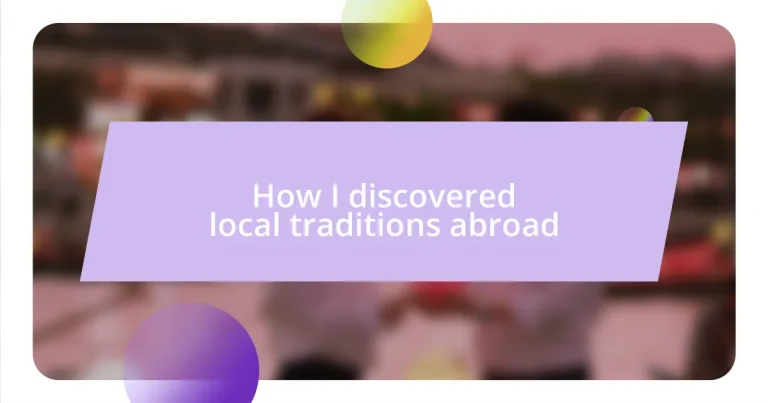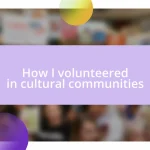Key takeaways:
- Engaging with local traditions through immersive experiences, such as tea ceremonies in Japan or dance groups in Mexico, fosters deeper cultural connections and understanding.
- Preparation, including researching customs and learning basic phrases, enhances cultural exploration and encourages meaningful interactions with locals.
- Sharing travel experiences and traditions with others creates opportunities for connection, learning, and appreciation of diverse cultures.
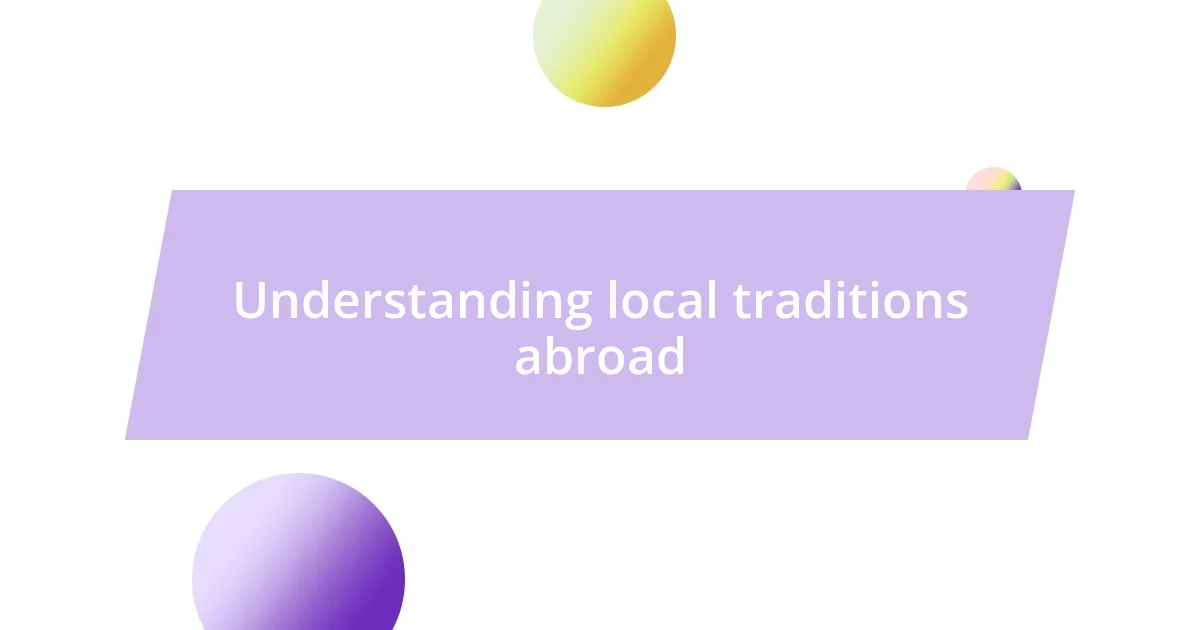
Understanding local traditions abroad
When I first traveled to Japan, I was struck by how deeply traditions are woven into everyday life. The ritual of tea ceremonies, for instance, isn’t just about drinking tea; it’s a serene practice that reflects respect and mindfulness. Could something as simple as a beverage truly hold such profound meaning? Absolutely—it opened my eyes to the idea that every tradition, no matter how small, offers a window into the values and history of a culture.
Visiting an Indian festival was another enlightening experience. The vibrant colors, traditional attire, and communal spirit made it apparent that these customs aren’t merely performances; they’re heartfelt expressions of identity and belonging. I remember feeling overwhelmed by the joy and energy, prompting me to ask: Why do some traditions resonate so deeply with us? It’s because they often remind us of shared human experiences—love, sorrow, celebration—which bridge the gap between cultures.
Understanding local traditions requires more than observation; it’s about immersion and reflection. I vividly recall sitting with a local family in Spain, participating in a culinary tradition that had been passed down for generations. Sharing laughter and stories over a meal created a bond that surpassed language barriers. Isn’t it fascinating how food can be a universal language, connecting us in ways we might never have expected? Each tradition, when embraced, enriches our understanding of humanity and helps us appreciate the beauty of diversity.
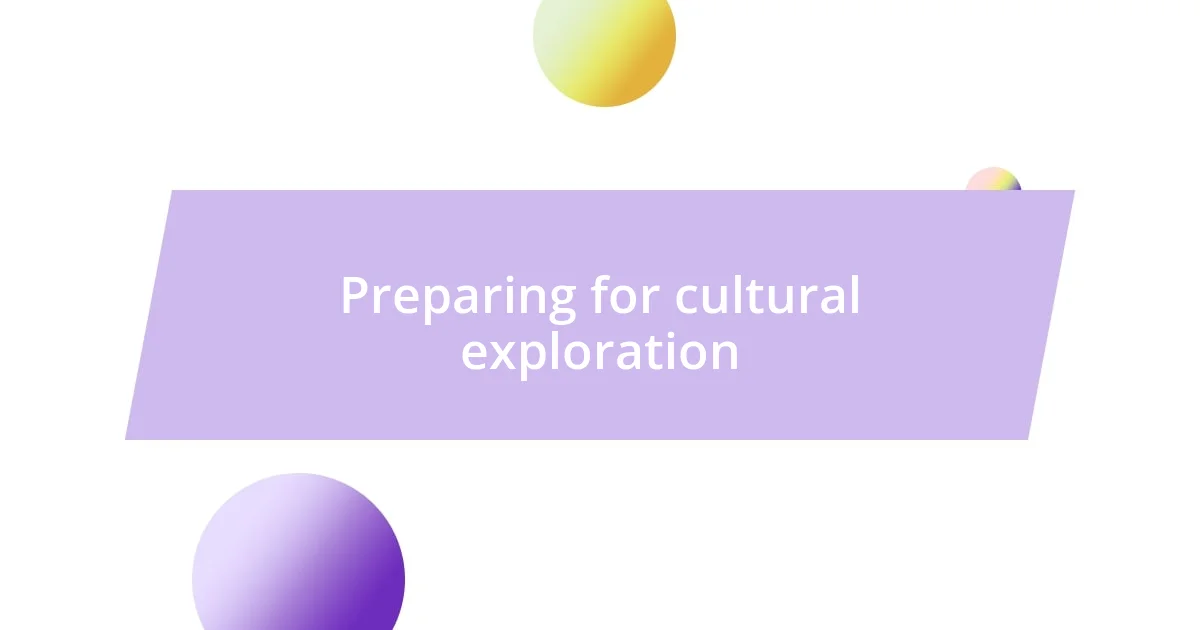
Preparing for cultural exploration
Preparing for cultural exploration is an exhilarating endeavor. I always find that doing a bit of homework before I travel makes all the difference. Researching local customs can unearth hidden gems that enhance my experience. For instance, learning about the meaning behind a local dance can transform a casual viewing into a deeper appreciation. I’ve taken to jotting down key phrases in the local language, too—it’s a small effort that can lead to meaningful connections with locals.
Here are a few tips that I’ve found helpful when prepping for my adventures:
- Read up on history and customs: Understanding the local context can enrich your experience.
- Learn basic phrases: This shows respect and opens doors for conversation.
- Connect with locals beforehand: Social media or travel forums can be great for finding people willing to share their traditions.
- Be open to spontaneity: Sometimes the best experiences come from unplanned encounters.
- Document your experiences: Keeping a travel journal helps reflect on the cultural insights gained.
With a little preparation, you’ll find that cultural exploration becomes not just a journey through new places, but also a personal growth experience enriched by the vibrant traditions you encounter.
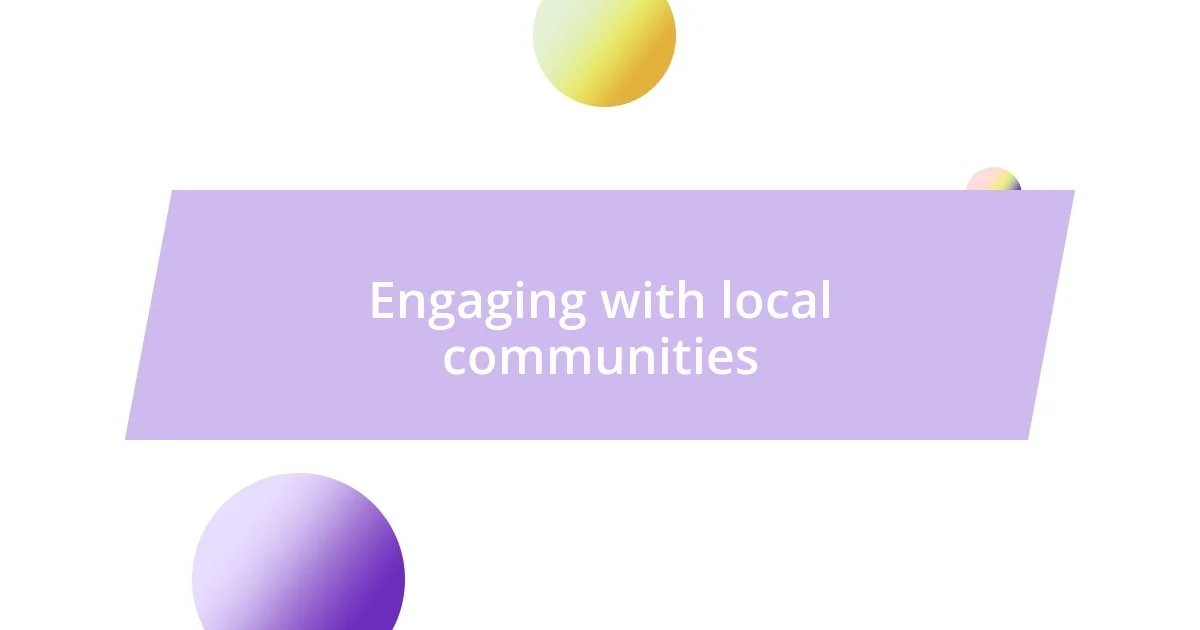
Engaging with local communities
Engaging with local communities is an enriching way to uncover the roots of traditions. During my time in Mexico, I joined a local dance group for a few weeks. The lively music and rhythmic movements were more than just an art form; they were living expressions of history and community bonding. As I swayed to the beat, surrounded by laughter and smiles, I felt a sense of belonging that transcended language—a reminder that true connection can be found in shared joy.
In contrast, during my travels in Norway, I volunteered in a small village. The townspeople were eager to share their customs, especially during their winter festival. I remember gathering with families to craft traditional ornaments, which filled the room with warmth and creativity. That experience grounded me, emphasizing the notion that traditions are not only preserved but also evolve through participation and collaboration with the local community.
Community engagement is not just about witnessing traditions; it’s about stepping into them. I once participated in a traditional cooking class in Thailand where locals taught me to make a beloved dish. Each ingredient had a story, and as we cooked together, I felt the weight of generations of knowledge being handed down. Sharing that meal later with the class was a revelation—a simple dinner transformed into a celebration of culture and connection that lingered long after the last bite.
| Experience | Insights Gained |
|---|---|
| Joining a dance group in Mexico | Felt a sense of belonging and understanding through shared joy. |
| Volunteering in Norway’s winter festival | Realized traditions evolve through community participation and collaboration. |
| Cooking class in Thailand | Learned the significance of culinary traditions and their role in cultural connection. |
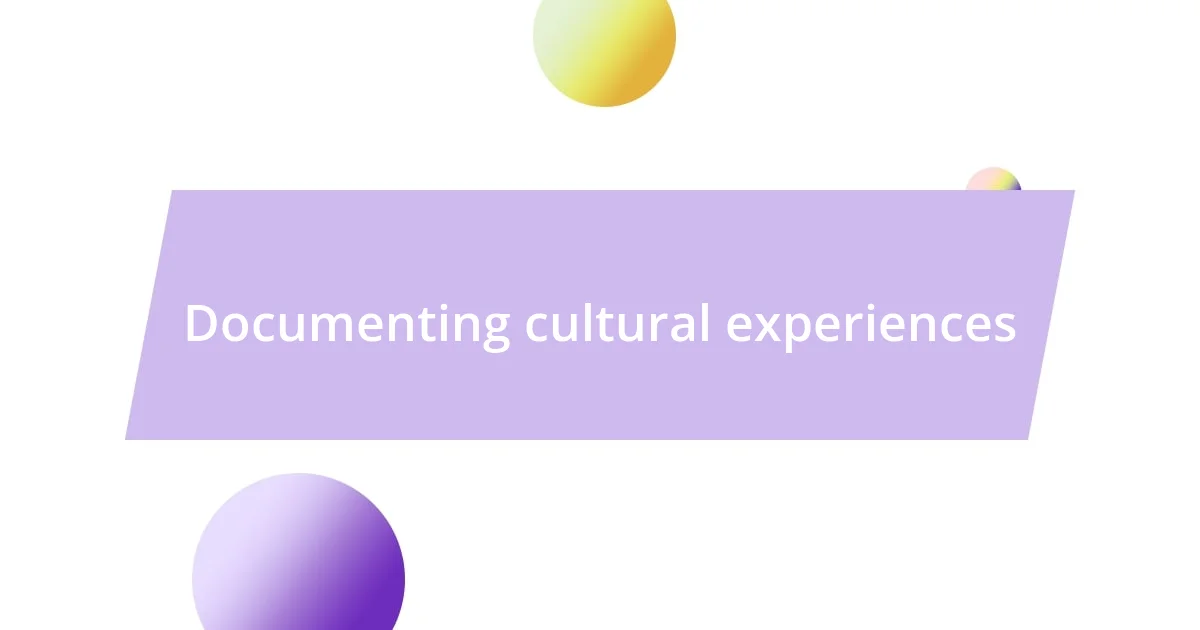
Documenting cultural experiences
Documenting cultural experiences can feel like preserving little pieces of the world that I’ve encountered. After one trip, I filled an entire journal with sketches of fascinating rituals and local art forms I experienced firsthand. Reflecting on those moments later helped me deeply appreciate the stories behind each practice, much more than a quick Instagram post ever could.
I often find myself snapping candid photos of locals engaging in their traditions. During one festival in India, I captured a moment of a grandmother teaching her granddaughter a traditional dance. That image spoke volumes to me—how the legacies of culture are passed down through generations, creating a vibrant tapestry of community. Have you ever thought about how those seemingly simple moments can hold so much history and emotion?
In addition to writing and photography, I like to collect small tokens from my travels—like a handmade bracelet or a local recipe. Each item becomes a tangible memory that transports me back to those enriching experiences. When I look at them, I’m reminded of the warmth of that bustling market or the laughter shared over a meal. It’s like holding onto a piece of another world, and I cherish that connection every time I recount the stories.
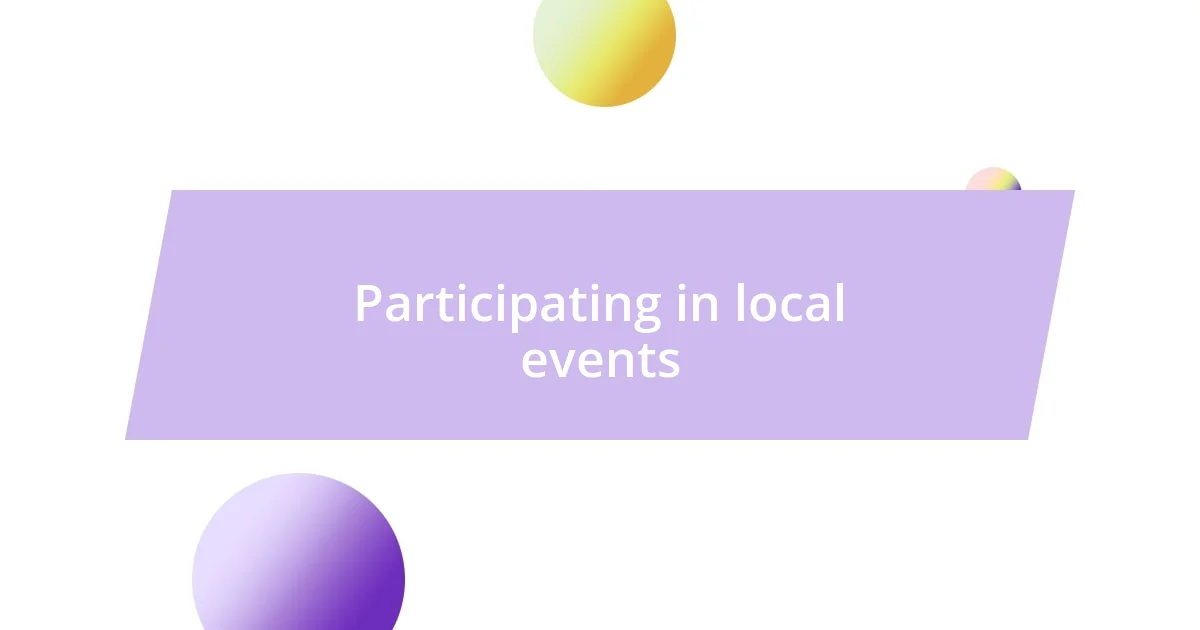
Participating in local events
Participating in local events has been some of my most memorable travel experiences. One vivid memory comes from my time in Japan, where I was invited to a traditional tea ceremony. As I wore a kimono, the meticulous movements of the host mesmerized me. Being part of that serene ritual revealed the importance of patience and presence in Japanese culture. It made me wonder, how often do we rush through our experiences, missing the beauty in small moments?
Attending a harvest festival in Italy was another highlight that left a lasting impression on me. Surrounded by locals, I learned to harvest olives, which meant getting my hands a bit dirty but also being immersed in the history of the land. Sharing stories and laughter over a communal meal afterward, I felt like a true participant rather than a mere observer. It was a reminder of how food ties us to our roots—have you ever tasted a meal that felt like a warm hug from the past?
In the vibrant streets of Brazil, I joined a lively Carnival parade and found myself swept up in the energy and colors. Dancing with locals who welcomed me with open arms turned into an exhilarating celebration of life. The joy was contagious, and I realized how these events create bonds that transcend barriers. In those moments, I understood that participating in local traditions fosters a deep connection with the culture, allowing me to experience the world through a different lens.

Reflecting on personal insights
Reflecting on my experiences abroad often unveils layers of understanding I hadn’t initially considered. For instance, while attending a vibrant street festival in Mexico, I was struck by how the community came together, celebrating both their heritage and each other. It made me contemplate: How do we cultivate that same sense of belonging in our own lives?
One moment that stands out is from my time in the highlands of Scotland, where I witnessed the passionate performance of traditional music. It felt like stepping into a time capsule, where every note carried stories of those who came before. In that fleeting connection, I realized how music acts as a bridge across time, tying me to a culture I had just begun to understand. Have you ever felt the pull of a melody that seemed to echo your very essence?
Every place I visit reshapes my worldview—especially during a quiet evening in an ancient village in Greece, sharing stories with locals over a simple meal. The warmth of their hospitality moved me deeply, and I remember thinking how these interactions remind us of our shared humanity. Isn’t it fascinating how, despite our varying backgrounds, food and laughter can unify us in unexpected ways?
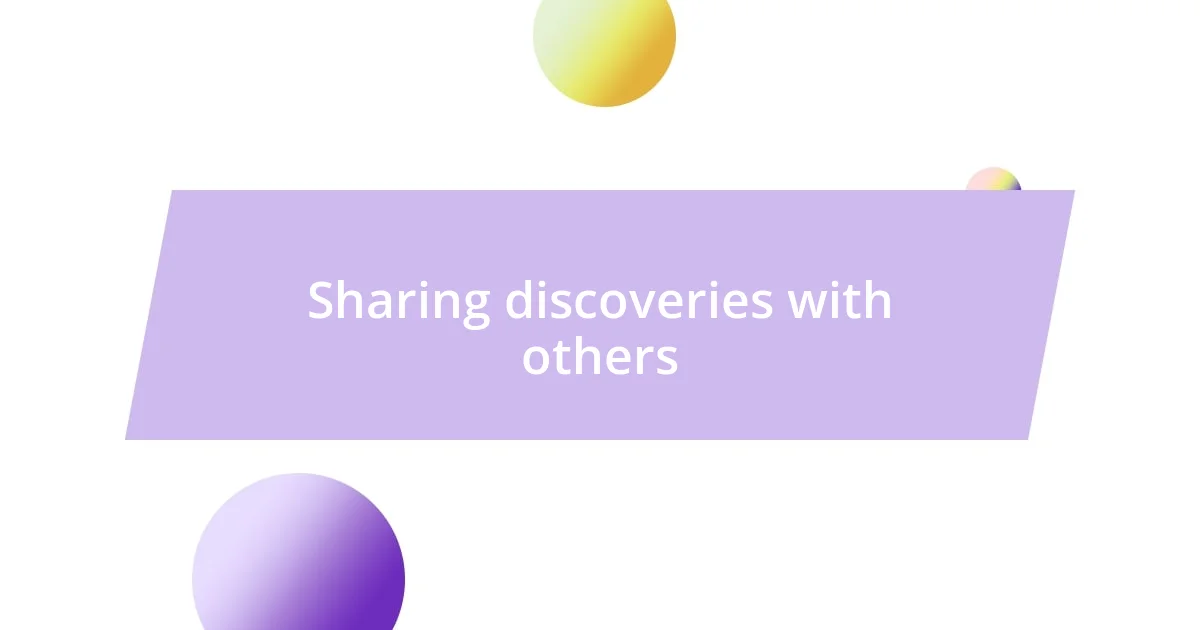
Sharing discoveries with others
Sharing what I’ve discovered during my travels has become a cherished part of my experiences. I remember returning home from a week in India, feeling compelled to gather friends for an evening of storytelling. We shared the incredible flavors of homemade curry while I recounted the vibrant colors and sounds of Diwali celebrations. As I spoke, their eyes widened with curiosity, and I could see the spark of interest as they imagined themselves standing in that festive atmosphere. Isn’t it amazing how stories can transport us, allowing others to catch a glimpse of a world they might never encounter?
When I visited the markets in Morocco, I was captivated by the intricate art of bargaining with local merchants. The thrill of haggling became a source of pride and camaraderie, as I learned how much of the transaction was about relationship-building. After coming back, I actually invited a few folks over to experience a mini Moroccan-style market at home. Watching them exchange playful banter while sampling spices and treats made me realize that sharing these traditions doesn’t just pass on knowledge—it creates an atmosphere of learning and joy. How can we capture that essence of connection in our everyday lives?
I’ve found that introducing friends to the local customs I’ve embraced can often spark deeper discussions about culture. After attending a traditional Maori feast in New Zealand, I couldn’t wait to share the experience of the haka dance and the importance of community in their rituals. I organized a themed dinner and recounted tales of the evening, and naturally, my friends had tons of questions—everything from the significance of each gesture to the flavors we enjoyed. It felt like weaving a tapestry of experiences, connecting us all through shared curiosity and admiration for different ways of life. How rewarding is it to witness people engage with traditions outside their own?
